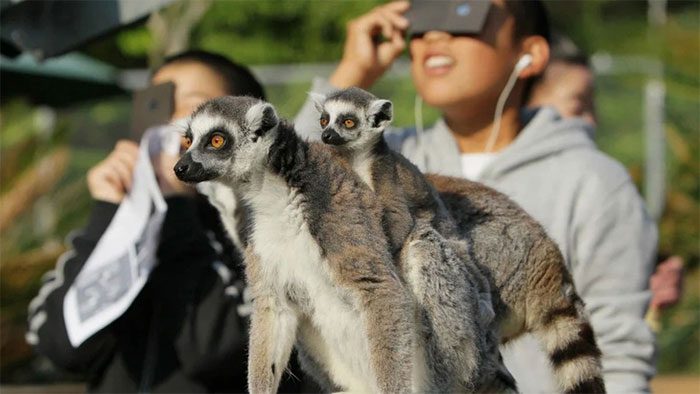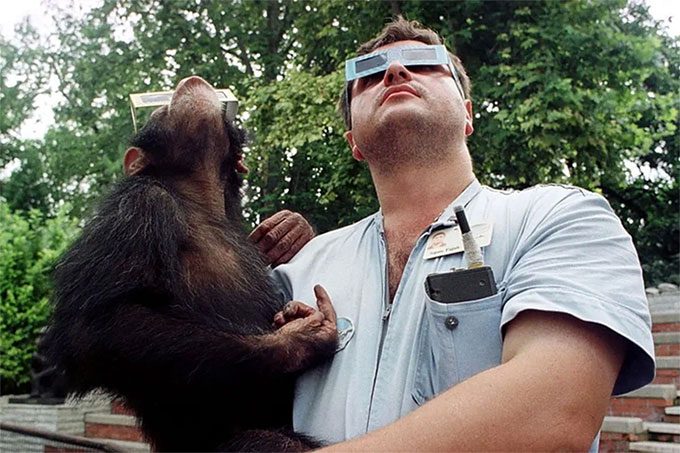Giraffes galloping, spiders spinning webs, gorillas grooming, crickets chirping… Many animals exhibit strange behaviors during a total solar eclipse.
Unusual Behaviors of Species During an Eclipse

The ring-tailed lemur was observed skipping breakfast during the last total solar eclipse – (Photo: CNN).
During the most recent total solar eclipse in the United States in 2017, animals in various zoos displayed many unusual behaviors that surprised researchers.
For example, at the Riverbanks Zoo in South Carolina, giraffes gathered and galloped, Galápagos tortoises began mating, and gorillas prepared to sleep.
Similarly, at the Nashville Zoo in Tennessee, zookeepers recorded giraffes galloping as the sky darkened in the middle of the day…
Dr. Adam Hartstone-Rose, a biologist at North Carolina State University, conducted extensive research on the unusual behaviors of animals during this total solar eclipse. The findings were recently shared with the media ahead of the upcoming total solar eclipse on April 8.
“Giraffes are elegant creatures; they do not run much. When they do run, it is because they are escaping from a predator or something dangerous,” Dr. Adam Hartstone-Rose stated.
He and his colleagues studied 17 species during the total solar eclipse in 2017 and found that about 75% of zoo animals exhibited “strange” responses during the eclipse.
Most displayed behaviors typical of nighttime or signs of anxiety.
The research team proposed two explanations:
- First, animals respond according to the dimming of natural light and the temperature drop when the Sun “disappears” during a total solar eclipse.
- Second, they react to the excitement and commotion of humans during the eclipse. When confined in a zoo, the sudden cheering from people surrounding them can be alarming.
Meanwhile, Dr. Bryan Pijanowski, currently the director of the Global Sound Center at Purdue University (Indiana), mentioned that the effects of the Moon on daylight during a total solar eclipse can influence the animals’ biological rhythms.
The 24-hour biological clock inside animals guides them on how to react to the corresponding amount of light they receive. When they see the light dimming during a total solar eclipse, many species mistakenly believe night has arrived and prepare to rest.
This explains why gorillas in zoos seemed to whisper to each other to go to sleep, while Galápagos tortoises began mating… Similar behaviors were observed in insects, with crickets chirping, and bees returning to their hives.
Some animals even displayed rare behaviors, such as captive vervet monkeys suddenly grooming themselves vigorously, spiders spinning webs, and some amphibians emitting unusual calls.
Will These Behaviors Recur During the Upcoming Total Eclipse?

A chimpanzee observing a total solar eclipse in Belgrade, Serbia – (Photo: CNN)
Dr. Hartstone-Rose expressed curiosity about whether animals will repeat their unusual behaviors during the upcoming total solar eclipse on April 8.
Therefore, the team will continue their project, collecting images and videos of unusual animal behaviors along the path of the total solar eclipse.
It is expected that many locations in North America, including Mexico, the United States, and Canada, will witness this total solar eclipse, each for 3 or 4 minutes, on April 8.
Hartstone-Rose will lead a graduate research team to various zoos in Texas to gather data. He also encourages the community to contribute data for the project.
“While many people will look up at the sky to see the Sun disappear, there will surely be those curious about the behaviors of the living creatures around them during this rare event,” Hartstone-Rose said.


















































